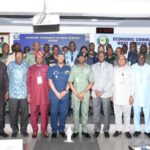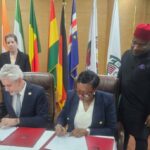Nigeria Reassures Diplomatic Community of Reform Success, Economic Stability and Religious Harmony.
By Raymond Enoch
The Federal Government of Nigeria has reaffirmed its commitment to economic transformation, national security, and religious harmony, emphasizing that the administration of President Bola Ahmed Tinubu, GCFR, is delivering on its “Renewed Hope Agenda” through decisive reforms that are already yielding measurable results.
Speaking on behalf of the Honourable Minister of Foreign Affairs, Ambassador Yusuf Maitama Tuggar, OON, the Permanent Secretary, Amb. Dunoma Umar Ahmed, PhD, delivered a comprehensive briefing to members of the Diplomatic Corps at the Ministry of Foreign Affairs in Abuja, outlining the nation’s reform trajectory, economic recovery measures, and reaffirmation of democratic and secular values.
Ambassador Ahmed praised Nigeria’s diplomatic partners for their sustained cooperation and expressed the government’s appreciation for their contributions to Nigeria’s development. “We value our cordial relationships with your countries and organizations, and we remain committed to effective engagement in the spirit of mutual benefit,” he said.
The Permanent Secretary highlighted President Tinubu’s far-reaching economic reforms, including the unification of multiple foreign exchange windows, the removal of fuel subsidies, and the reallocation of savings toward social and infrastructural investments. He described these as “bold and transformative policies restoring macroeconomic stability and rebuilding investor confidence.”
He noted that the administration’s Renewed Hope Economic Plan is steering the country toward sustainable prosperity, with renewed vitality in the oil sector, rising crude production, and the commencement of operations at the Dangote Refinery. Rehabilitation of existing refineries and the implementation of the Petroleum Industry Act (PIA), he added, have revived investor confidence in Nigeria’s energy sector.
Ambassador Ahmed also highlighted the diversification of the economy through investments in agriculture, mining, technology, and the creative industries. “Nigeria’s digital economy continues to expand, driven by fintech, e-commerce, and creative sectors that are enhancing employment and positioning the nation as a global innovation hub,” he stated.
Underscoring the government’s commitment to inclusive growth, he cited the implementation of the Student Loan (Access to Higher Education) Act, vocational education reforms, and empowerment initiatives targeting women, youth, and MSMEs. “We are ensuring that no Nigerian is denied higher education due to financial barriers,” he noted, adding that investments in housing, power, and infrastructure under the Renewed Hope Infrastructure Plan are improving national productivity and livelihoods.
Ambassador Ahmed emphasized that the Tinubu administration continues to prioritize national security through military, intelligence, and community-driven approaches. He reported significant progress against insurgent and criminal groups, as well as enhanced use of surveillance technology and civil-military cooperation to consolidate peace in affected regions.
Addressing recent external claims of religious persecution, the Permanent Secretary firmly rejected such assertions as “unfounded and misleading.” He stressed that Nigeria remains a secular state where Christians and Muslims coexist in mutual respect, with leadership positions shared across faiths.
“Nigeria’s Constitution guarantees freedom of religion and conscience. There is no offence of blasphemy in our national legal framework. Our diversity is our strength, and we remain a model of interfaith harmony and democratic resilience in Africa,” Ahmed affirmed.
He urged the international community to engage Nigeria on the basis of mutual respect and factual under








